-Budget Updates:
The Senate Early Action/Supplemental Budget, ESHB 1086, had a hearing on February 2nd and will likely be voted on in the Senate by the end of the week. Like the House bill, this bill also doesn’t close the full budget gap for 2011, but makes $394 million in reductions, reversions, and fund transfers towards closing the gap. The final budget needs to be passed by both House and Senate.
Here are the proposed cuts to AHNC priority items and other hunger relief programs that were included in the Senate supplemental budget and the comparison to the House funding:
1. DSHS State Food Assistance Program(food stamp look-a-like for legal immigrants)
The same as the House, the Senate Supplemental Budget also contains $4.8 million for State Food Assistance through the end of June 2011, half of the total estimated to be needed to sustain current benefits and current recipients. We are pleased that both the House and the Senate rejected elimination of this critical hunger-relief program.
The Senate proviso direction is stronger than the House, stating in the bill:
“To ensure expenditures remain within available funds appropriated in this section, the legislature establishes the benefit under the state food assistance program, made pursuant to RCW74.08A.120, to be fifty percent of the federal supplemental nutrition assistance program benefit amount.”
AHNC advocates will continue to work to ensure that the language in the final budget treats all currently qualified individuals equally and fairly.
2. WSDA food programs(EFAP, TEFAP, CSFP)
The same as the House proposal, the Senate budget document makes an administrative reduction of $241K to the “Department of Agriculture, Reduce Food Program Administration,” and specifically states that grants will not be reduced.
House and Senate budget bill language:
"REDUCE FOOD PROGRAM ADMINISTRATION - The Washington State Department of Agriculture (WSDA) will maintain administrative vacancies, and partially shift state match requirements to other existing general fund resources available as a result of combining the food programs transferred from the Department of General Administration and the Department of Commerce during the 2010 Legislative Session within the WSDA. Pass through grants will not be impacted."
3. Farmer’s Market Nutrition Program
There were not cuts to this program in the House or Senate supplemental budgets.
4. Maternity Support Services
The service dollars for MSS were cut the same dollar amount in both House and Senate. AHNC is concerned about the effect these cuts will have both on the women and children served and on the clinics that offer these services.
Senate budget language:
REDUCE MATERNITY SUPPORT SRVCS PROG - Maternity Support Services (MSS) provide preventive health care services for pregnant and postpartum women. MSS includes professional observation, assessment, education, intervention, and counseling as provided by interdisciplinary teams comprised of community health nurses, nutritionists, and behavioral health specialists. Beginning March 1, 2011, MSS funding will be reduced by approximately 35 percent. The Department will prioritize evidence-based practices, and it will continue to target the remaining funding towards pregnant women with the highest risk of poor birth outcomes. To the extent practicable, the Department will also develop a mechanism to match local revenue support for MSS with federal Medicaid funds. (General Fund-State, General Fund-Federal)
5. School Meals
The same as the House, the Senate transferred funds within OSPI, and made a $3 million cut in funds provided to school districts to offer school meals. AHNC is concerned about the impact of these cuts on the quality of meals provided to children, and will follow this issue in the development of the biennial budget.
House and Senate language:
TRANSFER FOOD SERVICE PROGRAMS - Programs previously in the Education Reform budget are transferred to the School Food Services budget. The transferred programs include $1.67 million in FY 2011 for funds to eliminate the lunch co-pay for students in grades kindergarten through third grade who are eligible for reduced price lunch, and $5.29 million for FY 2011 for the meals for kids program under RCW 28A.235.145, which eliminates school breakfast co-pays for students eligible for reduced price meals, and provides assistance for school districts initiating summer food service programs.
FOOD SERVICE FUNDING - Funding provided for school food service federal matching funds is reduced in FY11.Additional funding supporting school food service programs in the Education Reform Budget is sufficient to satisfy federal matching requirements maintained by the National School Lunch Program, and those programs have now been transferred to the School Food Services budget.
Media on the State Food Assistance Program:
Here’s a link to an op-ed from Neal Philip of Lawyers Helping Hungry Children that was published in today’s TNT:
http://www.thenewstribune.com/2011/02/02/1526835/we-cant-afford-not-to-feed-hungry.html
And the news from SeattlePI.com about a federal judge ordering the program’s continuation:
http://www.seattlepi.com/local/434589_foodbenefits.html















